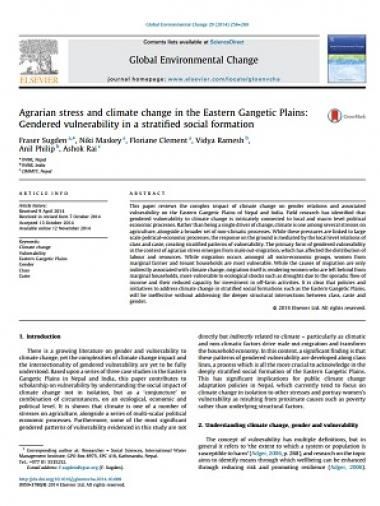Agrarian stress and climate change in the eastern Gangetic Plains: gendered vulnerability in a stratified social formation

This paper reviews the complex impact of climate change on gender relations and associated vulnerability on the Eastern Gangetic Plains of Nepal and India. Field research has identified that gendered vulnerability to climate change is intricately connected to local and macro level political economic processes. Rather than being a single driver of change, climate is one among several stresses on agriculture, alongside a broader set of non-climatic processes. While these pressures are linked to large scale political–economic processes, the response on the ground is mediated by the local level relations of class and caste, creating stratified patterns of vulnerability. The primary form of gendered vulnerability in the context of agrarian stress emerges from male out-migration, which has affected the distribution of labour and resources. While migration occurs amongst all socio-economic groups, women from marginal farmer and tenant households are most vulnerable. While the causes of migration are only indirectly associated with climate change, migration itself is rendering women who are left behind from marginal households, more vulnerable to ecological shocks such as droughts due to the sporadic flow of income and their reduced capacity for investment in off-farm activities. It is clear that policies and initiatives to address climate change in stratified social formations such as the Eastern Gangetic Plains, will be ineffective without addressing the deeper structural intersections between class, caste and gender.
Citation
Sugden, Fraser; Maskey, Niki; Clement, Floriane; Ramesh, V. 2014. Agrarian stress and climate change in the eastern Gangetic Plains: gendered vulnerability in a stratified social formation. Global Environmental Change - Human and Policy Dimensions, 29:258-269. doi: http://dx.doi.org/10.1016/j.gloenvcha.2014.10.008